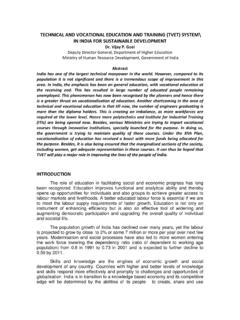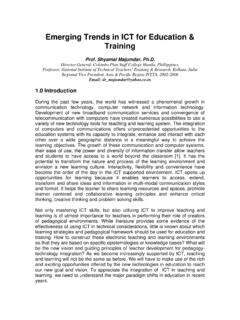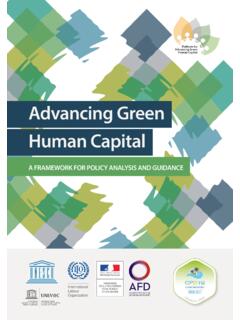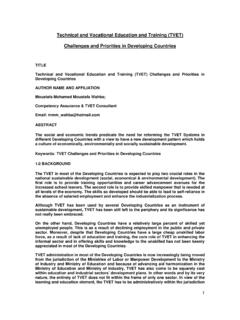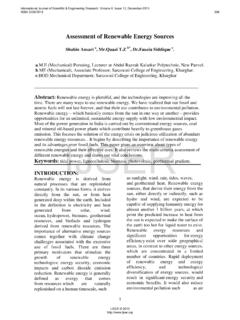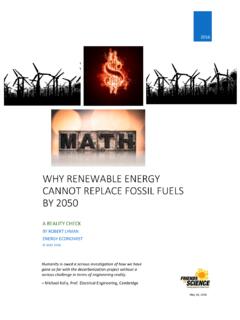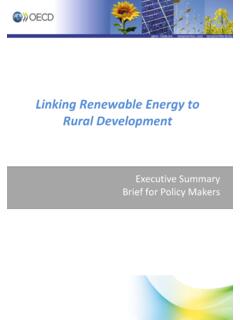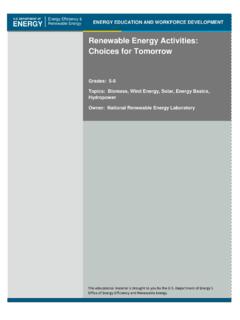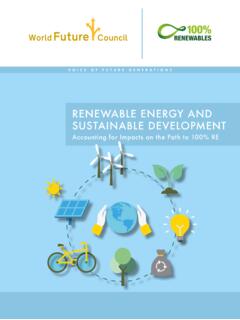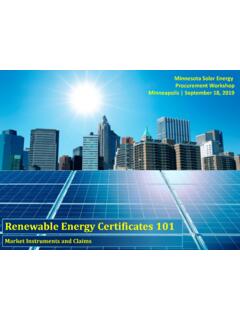Transcription of Skills development for renewable energy and energy …
1 Skills development for renewableenergy and energy efficient jobsDiscussion paper on solar energy demandsPublished in 2020 by the UNESCO-UNEVOC International Centre for TVETP latz der Vereinten Nationen 1, 53113 Bonn, Germany UNESCOThis publication is available in Open Access under the Attribution-ShareAlike IGO (CC-BY-SA IGO) license ( ). By using the content of this publication, the users accept to be bound by the terms of use of the UNESCO Open Access Repository ( ). The designations employed and the presentation of material throughout this publication do not imply the expression of any opinion whatsoever on the part of UNESCO concerning the legal status of any country, territory, city or area or of its authorities, or concerning the delimitation of its frontiers or boundaries. The ideas and opinions expressed in this publication are those of the authors; they are not necessarily those of UNESCO and do not commit the additional review and contributions from the Copenhagen Centre on energy Efficiency (C2E2), which is institutionally part of the UNEP-DTU to cite this documentUNESCO-UNEVOC.
2 2020. Skills development for renewable energy and energy effient jobs. Discussion paper on solar energy . Bonn, UNESCO-UNEVOC. Available from page attributionCover photo by Andreas G cklhorn on UnsplashBACKGROUNDG reen jobs in the energy sector ..ABOUT THIS DISCUSSION PAPERSECTION 1 Sustainable energy and TVET ..Shifts in the labour market ..Implications of market developments for TVET ..Challenges and opportunities in supporting the transition ..TVET for the solar energy field ..Applications and trends ..Mapping skill needs in new and existing jobs ..Revitalizing training for future skill demands ..References ..SECTION 2 Developing TVET ..Market/sector analysis ..Training development ..Quality ..ANNEXT able of contents44566781012121425262727283141454 6 Skills development for renewable energy and energy efficient jobs - Discussion paper on solar energy demands4 BACKGROUNDThe transition to greener economies requires action on the different dimensions of sustainability that can mitigate further deterioration of the environment and restore its capacity to support human life.
3 The rational use of energy like efficient water management, soil conservation, air-pollution control, preservation of natural resources, and biodiversity can play a crucial role in a country s contribution to the global sustainable future. energy use and efficiency is even more relevant given the fact that it is directly linked to some of the key global challenges that the world faces, such as poverty alleviation, climate change, and global environmental and food security. The most significant global policy development in recent years affecting the transition towards renewable energy and energy efficiency has been the ratification of the Paris Agreement by 189 of the 197 parties (current in May 2020) to the United Nations Framework Convention on Climate Change (UNFCCC)1. This has consolidated the global commitment to curtail climate change and adapt to its impacts.
4 As of May 2020, over 180 countries have put forward Nationally Determined Contributions stating that they will strengthen their efforts to limit temperature rise due to climate change to below 2 degrees Celsius above pre-industrial levels. To do this, national and international efforts will need to focus on establishing the necessary financial flows as well as technological and capacity building frameworks. Emissions from the burning of fossil fuels are major contributors to the unpredictable effects of climate change. By moving to more efficient production and energy use, switching to cleaner fuels, transportation that is more efficient and cleaner electricity supply, the further effects of global warming can be abated. However, moving from today s fossil fuel-based economies towards a new paradigm of clean energy in low-carbon economies and societies presents a number of challenges that have to be tackled.
5 These range from broader policy development and implementation strategies, to more specific and practical issues, such as the availability of market-ready technologies and countries abilities and/or capacities to actually promote their uptake. One of the key challenges is to develop a workforce that possesses the knowledge, Skills and competences needed to render operational all the energy efficiency and renewable technology options available. There must be enough appropriately trained personnel to cope with the growing 1 for green-collar professionals, and particularly for specialists with advanced Skills like engineers and technicians. Rapid growth in solar energy applications has led to skill shortages and deficiencies in solar installation and maintenance in many countries. Shortages in these occupations are common in developed countries, and they can easily occur in developing countries if there is to be a sudden increase in demand (ILO and EU, 2011).
6 Despite these challenges, the global transition to low carbon and sustainable economies can create large numbers of green jobs across these sectors and become an engine for sustainable development . The creation of green jobs is occurring in both developed and developing countries (UNEP, ILO et al., 2008). Apart from some sectorial and/or regional differences, the trend in recent years seems clear: renewable energy sources increasingly figure in the process of greening the economy, while restructuring of employment in this area is most likely to continue to grow in the near jobs in the energy sectorWhen it comes to establishing the necessary financial flows as well as technological and capacity building frameworks, one of the key efforts will be to increase investment in renewable energy and energy efficiency measures. It is estimated that USD 1 million invested in renewable energy and energy efficiency creates and full-time equivalent jobs respectively (compared to only for fossil fuels), and this shift towards a more sustainable energy supply will also drive the creation of new employment Indeed, the future for green jobs in the energy sector is promising: it is a growing market for both advanced Skills and lower skilled professionals.
7 Worldwide, the sector employed 11 million people at the end of 2018 (IRENA, 2019). Many governments pursuing reduced emissions to meet their climate goals and the socio-economic benefits have put the development of renewable energy at the top of the agenda The ILO has projected the creation of up to 24 million new jobs by 2030 in the renewable energy sector (ILO, 2018) With the phasing out of coal and ongoing transition towards sustainable energy sources in the European Union, the deployment of clean energy technologies in coal producing regions is projected to create up to 460,000 jobs by 2050 (European Union, 2020)2 development for renewable energy and energy efficient jobs - Discussion paper on solar energy5As markets develop and mature, the qualification level of workers in the renewable energy sector tends to exceed that of the average qualification level for the rest of the economy.
8 This will also affect professionals with lower skill levels, who will be able to move towards an increasing specialization of competences and, consequently, better job conditions and opportunities (ILO, 2011). Technical and vocational education and training (TVET) plays a crucial role in the transition to cleaner energy , as the Skills needed in the provision of sustainable energy will be acquired through it. The speed of this transition will therefore be determined to some extent by the responsiveness of training organizations and practitioners in strengthening the available offer, and by the interest and willingness of professionals to engage in initial and/or continuing THIS PAPERThis paper discusses the developments in the renewable energy sector and their impact on jobs and training. It compiles and makes an analysis of how the available technologies in the market will further develop corresponding with global trends in the energy efficiency and renewable energy sectors, and the corresponding capacities that are needed to make the transition from fossil fuel-based consumption into another supported by renewable energy .
9 The role of TVET in developing Skills and qualified professionals for jobs in the renewable energy sector is a key vector of analysis. Section 1 discusses the market demands for Skills in the renewable energy sector, the changes that are shaping these demands and corresponding Skills , as well as the competences and qualifications that are needed to meet the demands and fully seize the job opportunities. Models of how competency profiles are identified and used as bases for developing targeted training are also presented, as part of discussions to introduce the key intersections and degree of collaboration needed in the education and training sector and the labour market where technology uptake and demand for Skills develop. Section 2 presents an implementation-oriented scenario of the intersections between education and training on the one hand, and the labour market on the other.
10 It offers specific guidance for institutions to become successful in developing Skills interventions and understand the level of information, market-based analysis that goes into planning for robust and market-oriented training programmes in the renewable energy sector. Examples and steps described in this section are based on actual programmes and projects that were implemented in different countries by a renewable energy academy. They are not prescribed as absolute and easy to adapt to all types of TVET contexts and labour market status. Instead, they serve as reference points that can assist discussions related to opportunities, according to countries TVET contexts and experiences in developing training for the solar energy sector. This section covers the important structure of market and gap analyses, considerations for planning and designing training and occupation standards, as well as quality assurance.
